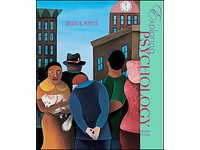Bestselling Books
|
Bestselling Books |
|
| US Bestsellers UK Bestsellers France - Meilleurs Ventes Canada Bestsellers Germany Bestsellers |
 Hooked on books? BestBooks.biz features book-related articles, book extracts and book selections from the best books - past and present. 404 Not Found/RequestFormattedAds.aspx was not found on this server.Resin-3.0.18 (built Fri, 24 Feb 2006 02:47:03 PST)
|
PerceptionPerception is the word used to describe the process by which we get information from our sense organs. Our brains convert that information into what we see, hear, touch, smell and feel. Notice that there is a clear distinction between sensation, which is a matter of acquiring raw data about the world, and perception, which is much more complex. We are wrong to think that our eyes work like a television camera, simply providing the brain with a complete picture of the world. There is plenty of evidence to show that the process is considerably more complicated. For example, the eyes see the world upside down with the left eye providing information to the right-hand side of the brain and the right eye to the left side of the brain. But we do not see an upside-down, mirror image of reality. The brain has corrected the image presented to it by the eyes so that we see the world the correct way around. Perception is far from being a passive process. Three principles are relevant in understanding this: SelectionThe sense organs are deluged with information but we are not aware of most of this data. The senses are windows, sensitive only to a small range of stimuli but we do not perceive much of the information the sense organs receive within these windows of sensitivity. For example, example, we are not aware of our clothes touching our bodies unless we actively think about them. Equally, we are not aware of the sound of our own breathing. InferenceWe pay attention only to fraction of the information available to us. But perception goes beyond this filtering in that we add to the information supplied by the senses. OrganizationThe process of perception involves the organization of data. |
 Psychology: A Very Short Introductionby Gillian Butler, Freda McManusIn Psychology: A Very Short Introduction, Dr. Gillian Butler and Dr. Freda McManus provide an understanding of some of psychology's leading ideas and their practical relevance. The authors answer some of the most frequently asked questions about psychology including: What is psychology? How do we use what is in the mind? How does psychology work? How do we influence each other? What can or can't a psychologist do for you? Psychology is a large part of our everyday experience, and this elemental guide is a stimulating introduction for anyone interested in understanding the human mind. More information and prices from: Amazon.com - US dollars Amazon.ca - Canadian dollars Amazon.co.uk - British pounds Amazon.de - Euros Amazon.fr - Euros  Exploring Psychologyby David G. MyersThrough all the editions of this best-selling text, David Myers has guided millions of students through their introduction to psychology course. As always the author's thorough updating, exceptionally communicative writing style and integrated use of the SQ3R learning system (Survey, Question, Read, Rehearse, Review) make the text supremely engaging and accessible. A comprehensive supplements package is available to help both students and instructors. More information and prices from: Amazon.com - US dollars Amazon.co.uk - British pounds Amazon.ca - Canadian dollars Amazon.de - Euros Amazon.fr - Euros |
|
|
|
|
|
|
|
|
| Copyright © 2000-20l7 Alan Price and BestBooks.biz contributors. All rights reserved. |